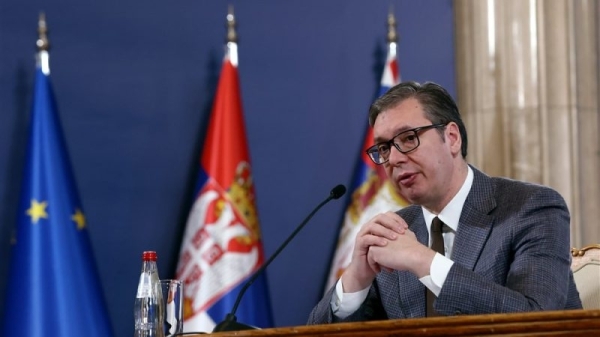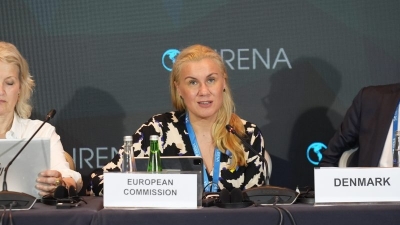Serbia backtracks on positive signals towards EU-brokered Kosovo proposal

An EU-brokered verbal agreement on the normalisation of relations between Serbia and Kosovo reached on Monday may have pleased the international community, however Serbian President Aleksander Vucic threw a spanner in the works on Wednesday.
Despite celebrations from the international community over, as per an EU-brokered proposal, Serbia and Kosovo gave tacit approval on Monday to an EU proposal to normalise relations between the two countries.
The 11-point plan, published for the first time this week, would see the two countries maintain good neighbourly relations, recognise each other’s official documents and national symbols, and would see Belgrade allow Kosovo to seek membership of the EU and United Nations.
While EU stakeholders were confident the deal would be signed at a meeting in North Macedonia in March and “no further discussions” were needed on the EU-proposed text, Vucic appears not to agree.
“We are ready to negotiate the implementation plan, but I will not sign this,” he told local media on Tuesday.
“That’s what I said to [French President] Macron and [German Chancellor] Scholz in Munich, and to all the big leaders … we cannot talk about mutual recognition and the entry of Kosovo into the UN,” said Vucic.
“As long as I am president, I will not sign or accept either formal or informal recognition of Kosovo or Kosovo joining the United Nations,” Vucic reiterated to local audiences.
He said that the following meetings with EU envoy Miroslav Lajcak would be about the implementation plan, adding that the pressures on Serbia will likely continue.
He also insisted on the creation of the controversial Association of Serb Municipalities.
Serbia has insisted Kosovo establish an association of Serb-majority municipalities (SMA), something that both Brussels and Washington back.
However, Pristina has been reluctant to allow a Belgrade-backed structure with executive powers, fearing the creation of a breakaway enclave that would undermine its sovereignty and a violate its constitution.
Leaders of Kosovo’s ethnic-Albanian majority argue such a body would give Belgrade an outsized influence in their country, while Serbs say it is needed to protect their rights. The concept has also led to protests in Kosovo from citizens who claim Serbs enjoy significant minority rights, including free electricity, Serbian language education, and mandates in local and national government.
Kosovo’s top court ruled in 2015 that the last association plan violated the constitution.
The exact setup of the association is yet to be confirmed, but it is likely to be a parallel structure with its own executive powers. Internationals, including US stakeholders, have said it will go ahead without the prime minister’s permission but also said it would be created in a way that does not violate the constitution.
Kosovo declared independence from Serbia in 2008 following the 1998-1999 war. Belgrade does not recognise this and considers Kosovo a province. Since then, tensions have simmered, and while both sides committed to an EU-facilitated dialogue process in 2013, little progress has been made.
Serbian Prime Minister Ana Brnabić commented that the credibility of the European Union now lies in the implementation of the association.
“In terms of euro integrations, regional cooperation and stability, the number one issue is the Belgrade-Pristina dialogue. Right now, the SMA needs to be on the agenda. Six points of the Brussels agreement, signed ten years ago, address the SMA and the credibility of the EU now lies in the implementation and formation so that we can move on”, Brnabić stated.
Serbian Foreign Minister Ivica Dačić said that by fighting to keep its sovereignty and territorial integrity, Serbia is giving unequivocal support to the territorial integrity of all UN member states.
“We feel that this is exactly how we should be protecting and defending the core principles of international law”, Dačić said.
Kosovo’s Prime Minister Albin Kurti shot back at Vucic’s comments stating, “Normalisation of relations is possible only if both parties negotiate in good faith. Serbia has apparently decided not to do so,” on Twitter.
Kosovo and Serbia leaders are set to meet in North Macedonia on March 18 for the next round of talks under EU supervision.



